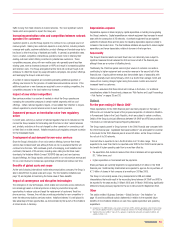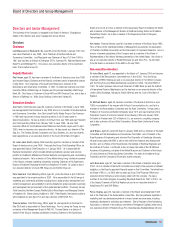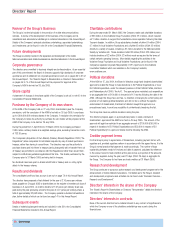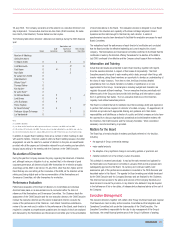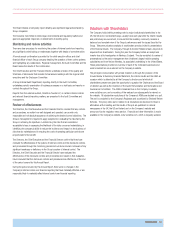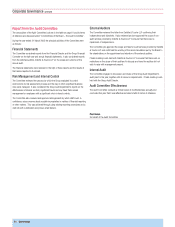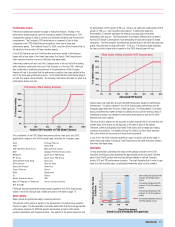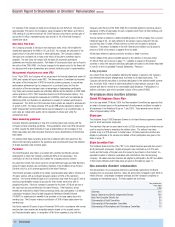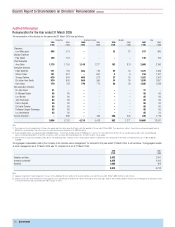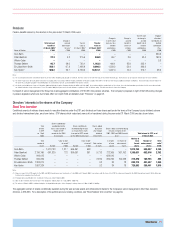Vodafone 2005 Annual Report Download - page 63
Download and view the complete annual report
Please find page 63 of the 2005 Vodafone annual report below. You can navigate through the pages in the report by either clicking on the pages listed below, or by using the keyword search tool below to find specific information within the annual report.
Governance |61
of recommendations to the Board. The evaluation process is designed to cover Board
processes, the structure and capability of the Board, strategic alignment, Board
dynamics and the skills brought to the Board by each director. A series of
questionnaires has also been developed to facilitate the evaluation processes for each
Board Committee.
The evaluations found the performance of each director to be effective and concluded
that the Board provides the effective leadership and control required for a listed
company. The Nominations and Governance Committee confirmed to the Board that the
contributions made by the directors offering themselves for re-election at the AGM in
July 2005 continued to be effective and the Company should support their re-election.
Information and Training
Actual financial results are presented to each Board meeting, together with reports
from the executive directors in respect of their areas of responsibility. The Chief
Executive presents his report to each meeting which deals, amongst other things, with
investor relations, giving Board members an opportunity to develop an understanding of
the views of major investors. From time to time, the Board receives detailed
presentations from non-Board members on matters of significance or on new
opportunities for the Group. Financial plans, including budgets and forecasts, are
regularly discussed at Board meetings. The non-executive directors periodically visit
different parts of the Group and are provided with briefings and information to assist
them in performing their duties. The non-executive directors and the Chairman
regularly meet without executives present.
The Board is confident that all its members have the knowledge, ability and experience
to perform the functions required of a director of a listed company. On appointment, all
directors are provided with appropriate training and guidance as to their duties,
responsibilities and liabilities as a director of a public and listed company and also have
the opportunity to discuss organisational, operational and administrative matters with
the Chairman, the Chief Executive and the Company Secretary. When considered
necessary, more formal training is provided.
Matters for the Board
The Board has a formal schedule of matters specifically referred to it for decision,
including:
•the approval of Group commercial strategy;
•major capital projects;
•the adoption of any significant change in accounting policies or practices; and
•material contracts not in the ordinary course of business.
This schedule is reviewed periodically. It was last formally reviewed and updated by
the Nominations and Governance Committee in January 2004 and its proposals were
subsequently approved by the Board. Its currency and continued validity were
assessed as part of the performance evaluations conducted in the 2005 financial year
described earlier in this Report. The agenda for Board meetings are initially developed
by the Chief Executive and the Company Secretary and are finalised by the Chairman.
The directors have access to the advice and services of the Company Secretary and
have resolved to ensure the provision, to any director who believes it may be required
in the furtherance of his or her duties, of independent professional advice at the cost of
the Company.
Executive Management
The executive directors, together with certain other Group functional heads and regional
Chief Executives, meet monthly as the Executive Committee and the Integration and
Operations Committee, both under the chairmanship of the Chief Executive. The
Executive Committee is responsible for the day-to-day management of the Group’s
businesses, the overall financial performance of the Group in fulfilment of strategy,
26 July 2005. The Company considers all of its present non-executive directors to be
fully independent. The executive directors are Arun Sarin (Chief Executive), Sir Julian
Horn-Smith, Peter Bamford, Thomas Geitner and Ken Hydon.
The following table shows directors’ attendance at meetings during the 2005 financial
year:
Nominations and
Audit Governance Remuneration
Board Committee Committee Committee
Number of Meetings
during the year to
31 March 2005 8436
Lord MacLaurin 8 3(1) 6
Paul Hazen 6 4(1) 3
Arun Sarin 8 3
Sir Julian Horn-Smith 8
Peter Bamford 8
Vittorio Colao(3) 1
Thomas Geitner 8
Ken Hydon(2) 8
Sir John Bond(4) 2
Dr Michael Boskin 6 2 4
Lord Broers 8 4 3
John Buchanan 8 4
Penny Hughes 8 6(1)
Sir David Scholey(2) 842
Professor Jürgen Schrempp 7 2 5
Luc Vandevelde 8 5
Notes:
(1) Committee Chairman.
(2) Ken Hydon and Sir David Scholey will resign from the Board on conclusion of the AGM on 26 July 2005.
(3) Vittorio Colao left the Board in July 2004. There was only one meeting held during the year whilst he was a director.
(4) Sir John Bond joined the Board on 1 January 2005 and from then until 31 March there were three Board meetings.
In addition to regular Board meetings, there are a number of other meetings to deal
with specific matters. Directors unable to attend a Board meeting because of another
engagement, as was the case for a number of directors in the year, are nevertheless
provided with all the papers and information relevant for such meeting and are able to
discuss issues arising in the meeting with the Chairman or the Chief Executive.
Re-election of Directors
During the year the Company reviewed its policy regarding the retirement of directors
and, although having no obligation to do so, resolved that, in the interests of good
corporate governance, all directors should offer themselves for re-election annually.
Accordingly, at the AGM, to be held on 26 July 2005, other than Ken Hydon and Sir
David Scholey who are retiring at the conclusion of the AGM, all the directors will be
retiring and, being eligible and on the recommendation of the Nominations and
Governance Committee, will offer themselves for re-election.
Performance Evaluation
Performance evaluation of the Board of directors, its Committees and individual
directors takes place on an annual basis and is conducted within the terms of
reference of the Nominations and Governance Committee. The Chairman leads the
assessment of the Chief Executive and the non-executive directors, the Chief Executive
reviews the executive directors and the senior independent director conducts the
review of the performance of the Chairman. Each Board Committee undertakes a
review of its own work and, in relation to the performance of the Board, each director is
required to complete a comprehensive questionnaire, the results of which are analysed
and discussed by the Nominations and Governance Committee prior to the presentation


